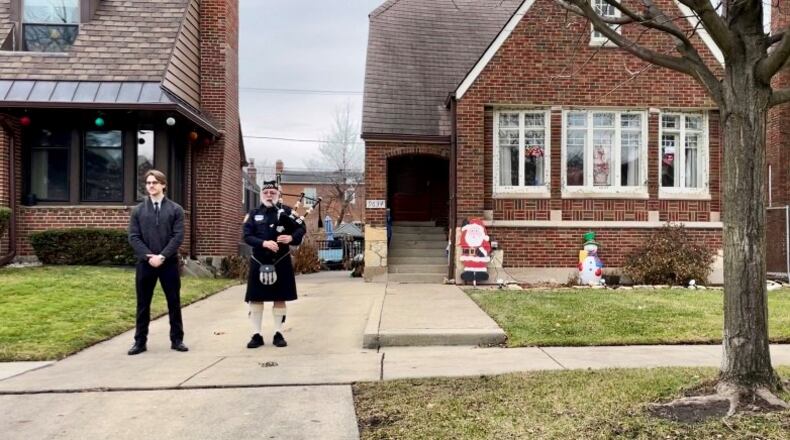As the funeral procession last week passed the home where I grew up, Chicago Police Department bagpiper Don McGrath stood in the empty driveway and bid farewell to my mother, Helen Gilligan Torpy.
Each of the dozens of vehicles slowly rolling through the neighborhood slowed down at the Torpy abode to absorb the moment.
Minutes earlier, the same bagpiper made sure all eyes were misty at Christ the King Catholic Church, as he huffed the melancholy strains of “Danny Boy,“ as Mom, an Irish immigrant, was readied for her final ride.
It’s a South Side Chicago tradition to pass the person’s house. Fourteen years earlier, my father’s funeral processed down that same street while his beloved dog, Tobey, stood leashed on that same driveway. I’m sure his canine brain was puzzled by the cavalcade.
Between being Irish, Catholic and a South Sider, there’s a myriad of traditions, liturgies and customs to contend with. The final goodbye is scripted like a George Bernard Shaw play, from the rosary beads in the decedent’s hands, to sinus-torturing incense to the post-funeral luncheon at a pizza joint. There, the drinks, stories and laughs flow as people from far and wide reacquaint and say we must stop seeing each other only at funerals.
Credit: Bill Torpy
Credit: Bill Torpy
And then they don’t meet again until someone else dies.
This was my third funeral in two trips to Chicago in the past month. That’s part of being in a large family.
There’s a solemn comfort to ritual, a certainty that guides you through the rocks and shoals of living. And dying.
My mother was incredulous of those who did not believe, who did not have the tethers of faith, family and community.
“What? You die and they just put you in the ground? And that’s it?!?” she said with disdain to those who ventured that they don’t know what happens when they depart this world. Her son was one of them.
Now she knows. Whatever it is.
Each Christmas season, the movie classic “It’s a Wonderful Life” is a must see. The tale of George Bailey witnessing an alternate universe without him being born demonstrates the mushrooming impact of one person’s life.
Fittingly, Mom died on Christmas Day. She adored the Christmas pull of family and religion and would not let the season go. Once, she kept her Christmas tree up until St. Valentine’s Day. (It was artificial). In fact, she often vowed to keep it up until St. Patrick’s Day.
Oddly, I wrote a column this Christmas about the sadness and joy that the holiday weaves together. And then she died that night. Her passing carried both sadness and relief and came after years of suffering from dementia. In essence, part of her departed years ago.
Credit: Some Gilligan
Credit: Some Gilligan
I was thinking of “It’s a Wonderful Life” when bidding farewell at Holy Sepulchre Cemetery, where she joined my dad, Bill.
At the cemetery, my wife, Julie, had the foresight to gather up family members for one grand family portrait: Mom’s four surviving kids, her 13 surviving grandkids and six (one in the oven) great-grandchildren — along with their partners. It was a fitting snapshot to chronicle the impact, and output, of one life.
On the surface, she lived a life that was not extraordinary. She came to Chicago 70 years ago from Limerick, Ireland, at age 22, got married and raised five kids, mostly working as a homemaker.
But she was the sail on the family’s boat, someone active in the parish and the community. She looked after a circuit of elderly folks and had a neighborhood of kids who looked up to her. She like to bust their chops, generally with a smile.
She was always working an angle, whether it was wallpapering dozens of people’s homes, serving lunches at the union hall or smuggling sweaters from Ireland for resale.
The week of a loved one’s death brings forth cascades memories and tales to be recounted.
One surrounds her coming to America in 1952. At the time, she worked for a small business in Limerick and had dated her boss, an Englishman. Her parents, fierce IRA folks, did not go for that. At all. Soon, she was on a ship headed to the USA. Her lone surviving sister disputes that, saying she came to live with a lonely aunt. I prefer the first story.
She was familiar with broken families and tried to patch them together.
Credit: Family photo
Credit: Family photo
When she was 12, she was called to a nearby convent to accompany a younger girl to the orphanage. Apparently, the idea was that having another child escort the girl might somehow take some of the torment from the ordeal. It was like something from a Dickens novel.
As a young woman in the 1950s, Mom returned to Ireland to bring two kids from an orphanage back with her to Chicago, where a couple waited to adopt them. It was reminiscent of the movie “Philomena,” where unwed girls in Ireland were sent to live in convents and their babies were adopted overseas.
A copy of a Chicago newspaper marking the event remains hidden in the piles in Mom’s home. The accouterments of a full life.
About the Author
Keep Reading
The Latest
Featured







